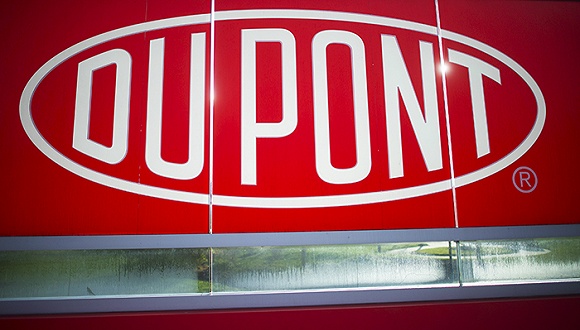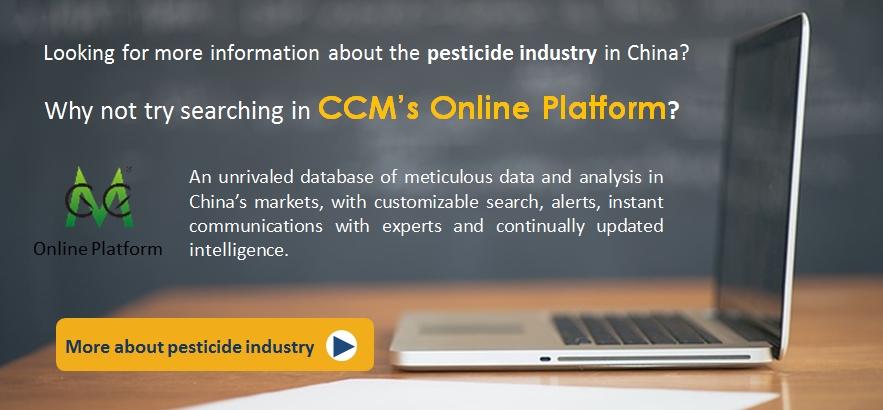DuPont Crop Protection achieved nearly double-digit growth in China last
year, while it suffered declining performance for two consecutive years on a global
scale. To gain a bigger share of pesticides business in China’s market, DuPont
has to win the war against the counterfeits first, as China has been one of the
emerging markets that fake pesticides at their most rampant all around the
world.

It is universally acknowledged that China is one of the
countries that suffer extremely serious problems of fake pesticides. There are
about 20%-30% pesticides among China’s
market is counterfeits.
Sima Qingyun, brand protection consultant of DuPont
Crop Protection of Asia-Pacific region delivered his speech on 14th March. Among his speech draft, there is a well-marked table named The Present
Situation of Counterfeit and Illegal Pesticides in Asia-Pacific Region.
The Present Situation and Tendency of Intellectual
Property Protection of Pesticides in Asia-Pacific Region


The statistical table above collected regulation
organizations of pesticides of various countries, and it also listed the
present situation of the illegal pesticides problems in nine countries and
regions, including China and India. The table pointed out nine categories of
problems, including illegal production of pesticide technical material, illegal
pesticide imports. Different colors indicate the orders of severity, among
which the red strands for widespread and serious problems, while the white
means there’s no problem.
When it comes to China, there six pesticides problems are
labeled red which represents the serious and widespread problems. However, the
problems of illegal pesticides imports and counterfeits producing by the means of recycling empty
packaging are not exist in China. The counterfeit pesticides are in buyer’s
market in China’s domestic market, therefore there are no such problems of
illegal imports. That explained the embarrassment Sima Qingyun has usually
encountered in the international meetings—people always asked him why there are
so many illegal export pesticides from China.
During the past three years, Sima Qingyun has been in
charge of anti-counterfeits of pesticide products which include insecticide and
herbicide. His major work is to conduct the sample testing on the suspected
illegal pesticides that circulated in the market, and he’s also responsible for
reporting the illegal producers to government. Those producers tend to use
inferior liquid to simulate DuPont’s pesticides, or to add some objectionable
ingredients in the products to achieve the insecticidal efficacy.

According to Sima Qingyun, the illegal pesticides that
have been checked and detained by the law enforcement agency of China reached
39 thousand tons in 2014; while the number in the other regions around the
world is less than a tenth of that in China. As China has better supervision
and regulatory system over pesticides than those other countries, the gap
between the two parts magnified even greater.
The fragmentation of China’s agricultural environment and
pesticides circulation system provides the illegal pesticides with living
space.
Due to the relatively small farming scale in China, the
pesticides have to go through multiple links from producers to buyers, and
farmers are not very familiar with the damages of the illegal pesticides.
No doubt it is a great challenge that a huge number of
illegal pesticides flow into the market. China’s market has not been the core
market for DuPont, but it is recognized as the most strategic one among the
emerging market.
DuPont’s agricultural business consists of crop protection and
seed sector. The sales in 2015 was USD9.789 billion, decreased by 16.5%
compared with that of 2013; and the profits was USD1.646 billion, declined by 33.6%. DuPont Crop Protection achieved nearly
double-digit growth in China last year, while it suffered declining performance
for two consecutive years on a global scale.
According to Huang Tianqiang, president of DuPont Corp
Protection of China region, the performance of DuPont Crop protection and seed sector
have been pulled down by both the falling agricultural product prices and the
strong US dollar that affected the revenue of some areas.
For DuPont and other pesticides producers, they could
have achieved faster speed of development in China’s market if there’s no
obstacle of illegal pesticides. According to the statistics provided by Sima
Qingyun, the sale of counterfeit pesticides reached to RMB150 million among the
illegal pesticides cases followed by DuPont Corp Protection. And those producers
that have been caught was just one part of the illegal pesticides production
chain.
DuPont’s strategy to China is to continuously put new
pesticides products into market and thus to keep the increase in terms of the
sales. The company planned to put at least two kinds of new products into China’s
market and it has already arranged four products on the list of marketing plan
for the next three years. A new insecticide specialized for the rice is
expected to be put on the market at the latest in 2018 after it gains the
approval from the related organizations.
However, if the market share of those new products is
occupied by the counterfeit pesticides, the capital and time that have been
invested into the project of developing new products would be wasted. DuPont
has been bothered by this issue for more than a decade. It encountered the
situation where the illegal producers used counterfeit pesticides that caused a
total loss of some farmers’ wheat to simulate DuPont’s first herbicides that
was put on China’s market. The chemical giant realized then that the work of anti-counterfeits
should always keep pace with the business of expanding China’s market.
*This article is an
edited and translated version by CCM. The original version comes from
Jiemian.com.

About CCM:
CCM is the leading market intelligence
provider for China’s agriculture, chemicals, food & ingredients and life
science markets. Founded in 2001, CCM offers a range of data and content
solutions, from price and trade data to industry newsletters and customized
market research reports. Our clients include Monsanto, DuPont, Shell, Bayer,
and Syngenta.
For more information about CCM, please
visit www.cnchemicals.com or
get in touch with us directly by emailing econtact@cnchemicals.com or
calling +86-20-37616606.
Tag: DuPont, pesticides